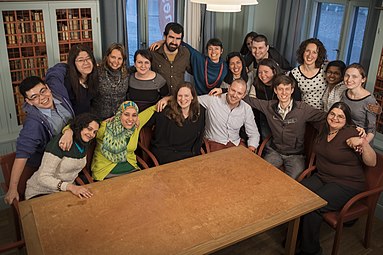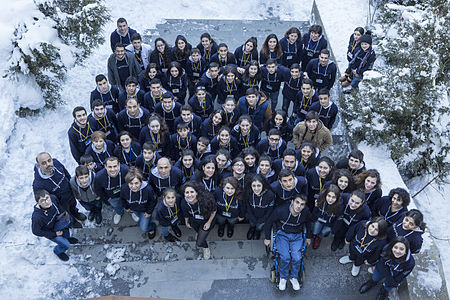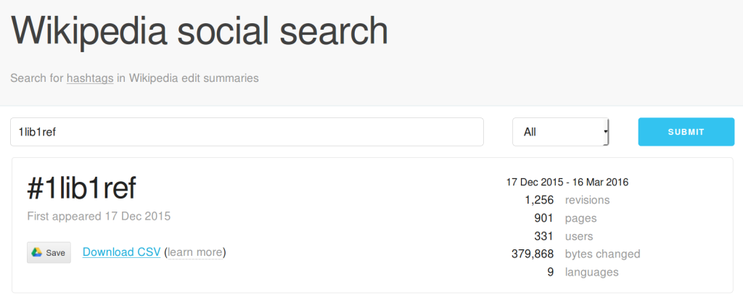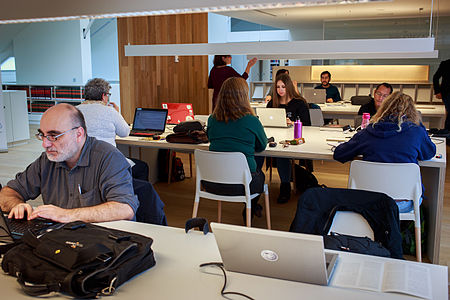Learning and Evaluation/Newsletter/2016/3/8/en
blogs, events
on Meta!
An open conversation to understand how useful current metrics are, what are their major issues, and how those issues could be addressed.
During the months of February and March, the
Program Capacity and Learning team in collaboration with the Community Resources team started the first phase of Global Metrics Review, a project that seeks to better understand what Global Metrics mean to grant committees, grantees, and WMF grants staff, comprehend its limitations and eventually, address those issues with solutions focused on community input. During the month of February, individual interviews were held with small groups, and during March, the consultation was open to the community on Meta. Here, feedback was provided publicly on the Talk Page, and privately, through a Qualtrics survey.
Initial results and analysis of this conversations were shared at Wikimedia Conference 2016. In this session, participants were asked to work in groups to brainstorm together around a few aspects that Global Metrics don't actually cover.
A summarized feedback report will be posted on wiki on the first half of May. The Global Metrics Review project has two more phases. From April 24 and until the end of May, we will be crafting solutions for the problems that emerged in the first phase. In this second phase, we will incorporate the input gathered at Wikimedia Conference. The third phase takes place during June, when solutions will be posted on Meta for community members to vote on, polling grantees, committee members, relevant WMF staff and interested community members. This will result in an updated set of Global Metrics, and corresponding training, resources and tool support. Stay tuned with this project! Add the project page to your watchlist.
More info:
Wikipedia Education Collaborative members met in Stockholm this March to brainstorm about the improvements they had implemented since last summer and set the goals for the upcoming eighteen months.
The event was organized by the Wikipedia Education team at the Wikimedia Foundation in collaboration with Wikimedia Sverige.
The Collab was formed in 2014 to bring Education Program leaders under one roof to build networks, share experiences and foster collaboration across education programs, organizations, volunteers and geographies throughout the movement. The Stockholm meeting was aimed at defining common goals, priorities and projects for the group to focus on over the next year.
The goals, like establishing best practices for education programs, gathering ideas for educational initiatives, sharing resources between global programs, developing a global recognition system, communicating effectively about experiences, tools and resources, were set earlier. Some of the goals have already been accomplished, like the new recognition system. The creation and translation of many educational resources, like a guide on how to evaluate article quality on Wikipedia, a guide to free licenses, the education program toolkit, and many other resources were also accomplished. Communication and documentation were set as a priority for the collective in the coming year.
This will not just help define a flexible mentoring roadmap as well as for the new phase but will lead a way for the development of resources, improvement of the communication strategy. Two projects the Collab will work on will be testing and translating the Program and Events Dashboard, a new platform which will facilitate the work of educators and the organization of programs using Wikipedia in the classroom, and a global outreach campaign. This new campaign will be targeting educators all around the world to engage them on the Wikipedia Education Program. We are in the process of redesigning the Collab page on Outreach-wiki. We invite you to follow that page for news updates and events.
More info:
blogs, events & more!
Every month, we share knowledge with a focus on programs, process or tools on Wikimedia Foundation's blog. Find all our entries on the Wikimedia blog
Featured blog posts:
The Armenian Wikimedia community looked beyond Wikipedia to implement their Wikipedia Education Program design. They designed and organized WikiCamps to improve Armenian Wiktionary. The Armenian language, that never saw a complete freely-licensed dictionary, was gifted with 10,000 entries in Wiktionary after end of this activity.
Read more in the Wikimedia blog.
Users can search edits with edit summary containing hashtags in Wikipedia's search bar. This new feature can help editors insert hashtag into ongoing edit-a-thons or any kind of editing activity. This blog goes over how hashtags have shown great success already in projects like 1lib1ref campaign, Cyberbot II, and others.
Growing hashtags: Expanding outreach on Wikipedia
| May
| ||||||
| Mon | Tue | Wed | Thu | Fri | Sat | Sun |
| 1 | ||||||
| 2 | 3 | 4 | 5 | 6 | 7 | 8 |
| 9 | 10 | 11 | 12 | 13 | 14 | 15 |
| 16 | 17 | 18 | 19 | 20 | 21 | 22 |
| 23 | 24 | 25 | 26 | 27 | 28 | 29 |
| 30 | 31 | |||||
May 13 - 15: FDC Deliberations, round 2
| June
| ||||||
| Mon | Tue | Wed | Thu | Fri | Sat | Sun |
| 1 | 2 | 3 | 4 | 5 | ||
| 6 | 7 | 8 | 9 | 10 | 11 | 12 |
| 13 | 14 | 15 | 16 | 17 | 18 | 19 |
| 20 | 21 | 22 | 23 | 24 | 25 | 26 |
| 27 | 28 | 29 | 30 | |||
June 1: FDC Recommendations due.
June 22 - 23: Wikimania 2016 Learning Day (Watch the Evaluation News page for an upcoming event page!)
June 22: Idea Lab Mixer at Wikimania.
June 24 - 26: Wikimania 2016, in Esino Lario
| July
| ||||||
| Mon | Tue | Wed | Thu | Fri | Sat | Sun |
| 1 | 2 | 3 | ||||
| 4 | 5 | 6 | 7 | 8 | 9 | 10 |
| 11 | 12 | 13 | 14 | 15 | 16 | 17 |
| 18 | 19 | 20 | 21 | 22 | 23 | 24 |
| 25 | 26 | 27 | 28 | 29 | 30 | 31 |
July 1: Board decision due for FDC Round 2.
GLAMing Madrid project: starting the collaboration with state museums in Spain
Wikimedia Spain has worked at three state museums in Madrid —the Museum of Romanticism, the Museo del Traje and the National Archaeological Museum— through its first Wikipedian in residence, Rubén Ojeda.
Rubén Ojeda has been working as Wikipedian in residence at three state museums in Madrid, between September, 2015 and January, 2016. In those four months we carried out various activities to promote the Wikimedia projects, explain how Wikipedia works and create content related to the three museums and their collections. 18 editing workshops for the public, 6 for the staff of the institutions and a triedit-a-thon were organized. All these acts involved a total of 81 people, 61 women (75.30%) and 20 men (24.70%).
In terms of content, 114 articles were edited, 64 of which were new, increasing the textual information in more than 200,000 bytes along three projects: Wikipedia, Wikibooks and Wikidata. In addition, between December 14, 2015 and January 14, 2016 was organized a writing contest, GLAMing Madrid Challenge, in which 30 users edited near 400 articles in ten different languages.
Another highlight was the media uploaded under free license to Wikimedia Commons in order to illustrate content in the various Wikimedia projects. The National Archaeological Museum uploaded 197 files, the Museo del Traje 58 and the Museum of Romanticism 122. We have to add 45 audio and video files, the result of recording classical music concerts at the Museum of Romanticism.
When inquired about this project, Rubén says the experience was very positive, as it not only allowed for the contribution of new quality content, but the organization also expanded its knowledge in varios areas, like Partnerships, organization and development activities, training others on Wikimedia projects, and recording music. «I encourage everyone to share the files that the project made available on Wikimedia projects», he states.
Further Reading:
IdeaLab is a space where wikimedians all over the world share their inspiration with others.
Inspire Campaigns are month-long events to focus collaborative efforts on some of the most pressing challenges of the Wikimedia movement, hosted on IdeaLab. Each campaign focuses on a unique theme and participation is open to everyone. Earlier this year, over the month of March, we sought ideas to improve content review and curation. Reviewing and curating is fundamental to Wikimedia's collaboratively edited projects, absorbing considerable volunteer time and effort as we seek to enhance the quality and visibility of existing content. Participants of the campaign submitted ideas and exchanged views answering the questions: «How would you improve or promote content curation and review processes in your projects?»
The second Inspire Campaign was held recently on IdeaLab. The first one was held during March 2015, and it focused on Gender Gap (you can review ideas submitted here). For this second campaign, 106 ideas were created, and 254 wikimedians took part, getting involved as creators, supporters or contributors on the ideas main and talk pages. Review ideas submitted on Inspire Campaign page and support participants by expanding their submissions! Our next campaign is anticipated to run in June, and it will focus on addressing harassment.
Read more:
- Inspire Campaign promotes quality and visibility of content across Wikimedia projects (entry on Wikimedia blog).
Join the IdeaLab community. You can help develop ideas in many ways: with technical skills, translating, networking and more. Share your own!
The Program Evaluation & Design portal has tools to learn about your activities and measure their success.
The Learning Pattern Library is a hub to share learning around certain challenges that are common across Wikimedia programs and projects. Featured Learning Patterns in this issue:
Inexperienced users often upload to Commons uncategorized, poorly described and then abandoned stuff, which remains invisible and unutilized for ages. In this Learning Pattern, Spiritia shares how to use CatScan to solve this. Go to Learning Pattern.
Which scalable solution can we use to teach new contributors how to contribute to Wikimedia project? Cyrille WMFr and Jules78120 (Wikimedia France) explain how to use a MOOC for this end and involve communities in creating this type of online course. Go to Learning Pattern.
Share what you know with the PE&D Community. Introduce yourself in the Community!













